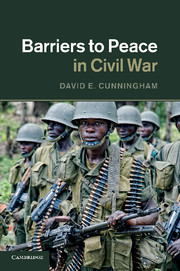Book contents
- Frontmatter
- Contents
- List of figures
- List of tables
- Acknowledgements
- List of acronyms
- 1 Introduction
- 2 A veto player theory of conflict bargaining
- 3 Testing the effect of veto players on duration
- 4 Bargaining and fighting in Rwanda and Burundi
- 5 The effects of veto players on conflict severity, genocide, and the duration of peace
- 6 Designing peace processes in multi-party civil wars
- 7 Conclusion
- Appendix A Civil wars included in the dataset
- Appendix B Descriptive statistics for variables in quantitative analyses
- References
- Index
4 - Bargaining and fighting in Rwanda and Burundi
Published online by Cambridge University Press: 05 October 2012
- Frontmatter
- Contents
- List of figures
- List of tables
- Acknowledgements
- List of acronyms
- 1 Introduction
- 2 A veto player theory of conflict bargaining
- 3 Testing the effect of veto players on duration
- 4 Bargaining and fighting in Rwanda and Burundi
- 5 The effects of veto players on conflict severity, genocide, and the duration of peace
- 6 Designing peace processes in multi-party civil wars
- 7 Conclusion
- Appendix A Civil wars included in the dataset
- Appendix B Descriptive statistics for variables in quantitative analyses
- References
- Index
Summary
The statistical analysis in Chapter 3 showed that civil wars are longer when they involve more actors that can block agreement. What it could not show, however, is whether they are longer because of the dynamics identified in the theoretical argument in Chapter 2. In this chapter, I use qualitative analysis to further our understanding of the dynamics of multi-party conflicts by conducting a comparative analysis of negotiations in a two-combatant civil war in Rwanda (1990–4) and a multi-party conflict in Burundi (1991–2008).
The analysis in this chapter proceeds in three parts. In the first section, I set up the case studies by explaining what the theoretical argument in Chapter 2 would predict about the differences between two-party and multi-party negotiations in civil wars generally, and about the specific cases of Rwanda and Burundi examined here. I discuss why Rwanda and Burundi are good cases for testing the veto player approach and provide a brief background to each conflict. In the second section, I analyze each of four predictions from the veto player approach based on detailed evidence from Rwanda and Burundi. A comparison of these two cases supports the veto player framework by showing that negotiating peace was significantly more difficult in Burundi, because of incentives to hold out, information asymmetries, and shifting alliances. The third section analyzes the role of non-combatant veto players in the conflicts in Rwanda and Burundi.
- Type
- Chapter
- Information
- Barriers to Peace in Civil War , pp. 132 - 182Publisher: Cambridge University PressPrint publication year: 2011



